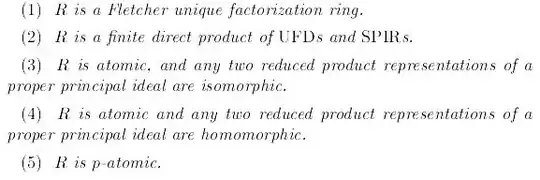I am taking following definitions and calling algebraic structure U1 and U2 definition as:
U1 is A ring R with unity and properties properties
Every element of R is neither 0 nor a unit can be factored into a product of finite no. of primes
And factorization unique upto associates.
U2 is A ring R with unity and properties properties
Every element of R is neither 0 nor a unit can be factored into a product of finite no. of irreducible
And factorization unique upto associates.
Are U1 and U2 equivalent? What if I include commutative condition also? Does there exist structure like this? What is example of U2 which is not UFD?(if possible)
Note: a and b Associate means if a=ub or a = bv then u and v are unit






